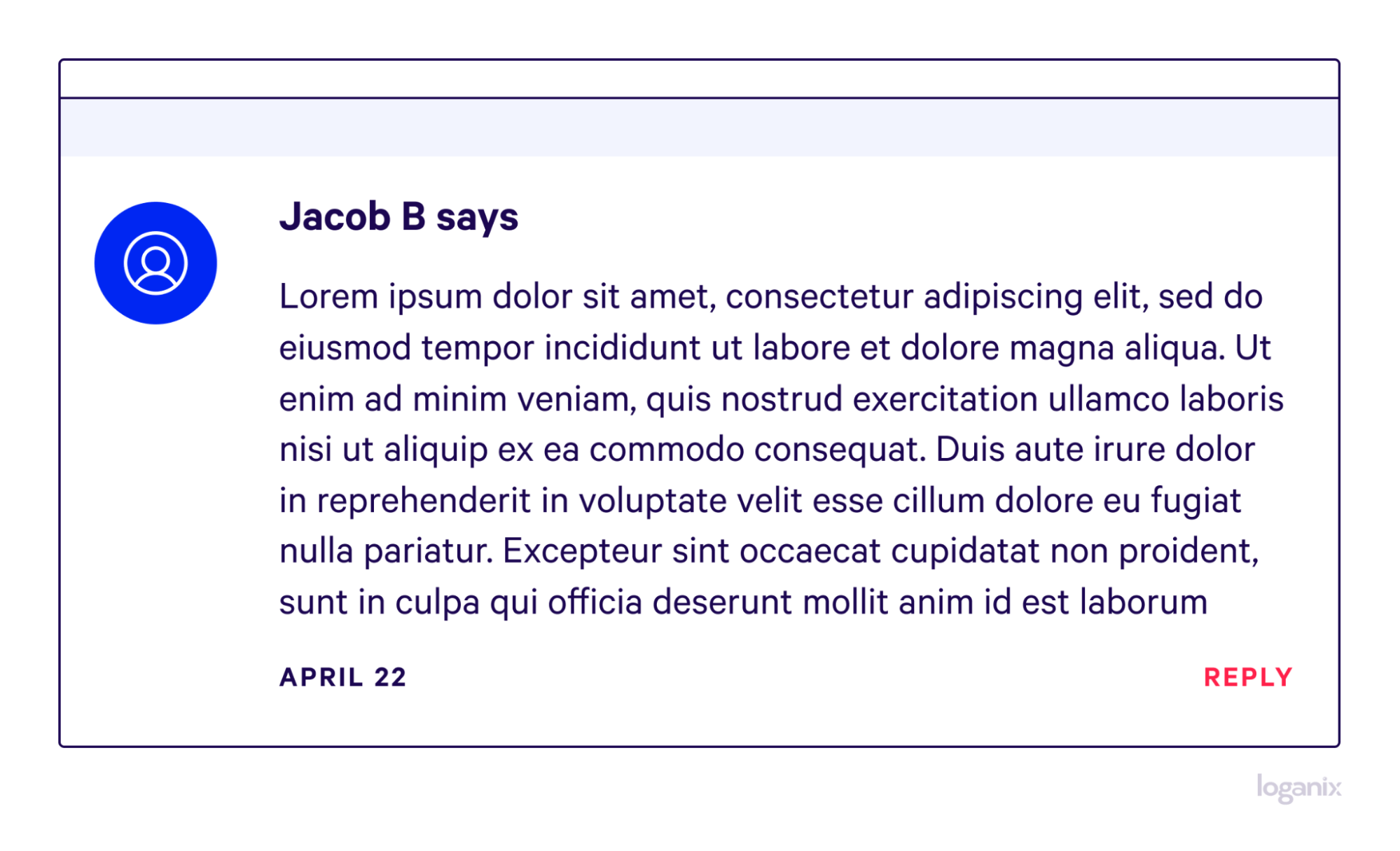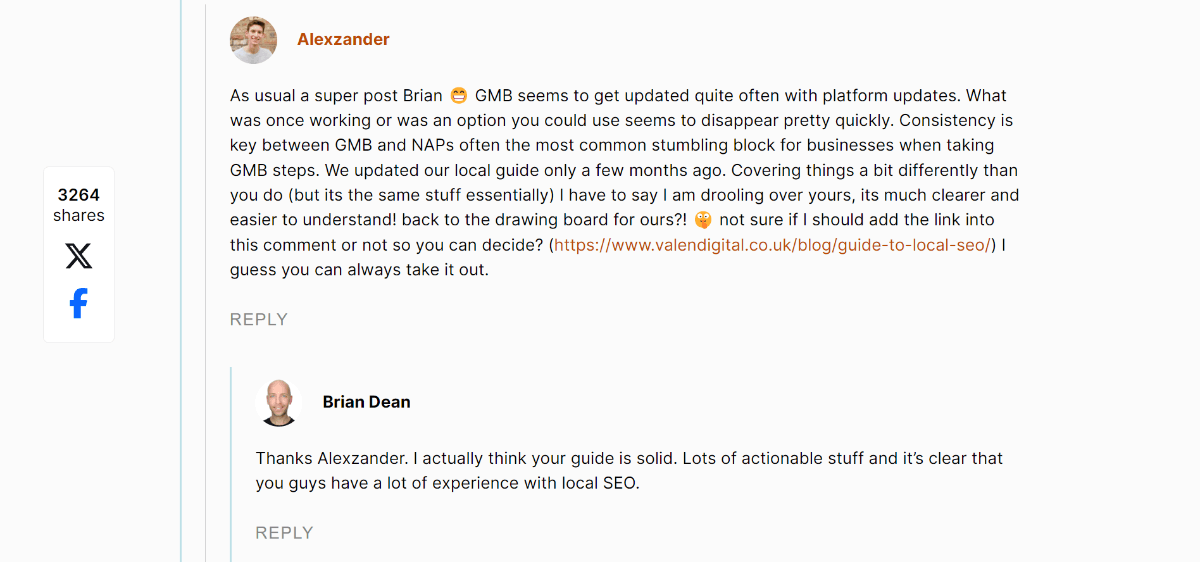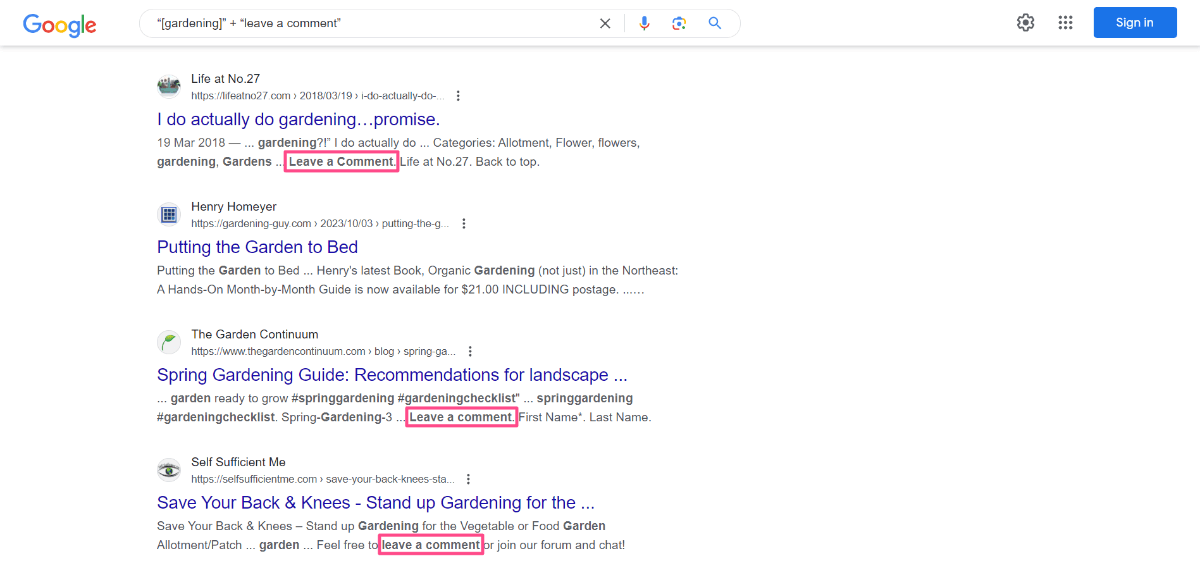Comment Links & SEO: 3 Blog Commenting Tips

Hand off the toughest tasks in SEO, PPC, and content without compromising quality
Explore ServicesSEO is a hard-fought game of to-and-fro. Rug, reoptimize, rug, reoptimize.
So, when you hear about “easy” SEO tactics like blog commenting, you might scoff. Weren’t they banished to the internet graveyard years ago, along with keyword stuffing and pop-up ads?
Turns out, they’re not entirely useless.
Done strategically, blog commenting can drive targeted traffic, position you as an expert, and even lead to guest post offers, affiliate deals, or podcast interviews. Let’s explore.
What are Blog Comments?
Blog comments are the reader responses found below a blog post. They typically include:
- The commenter’s name (that’s sometimes hyperlinked to their website).
- A date or timestamp that shows when the comment was made.
- The comment body or the actual text of the comment.
- A small profile picture which is called the avatar (optional).
- And a reply button that allows for threaded discussions under a main comment.
They’re really no different from comments left in a Facebook, Instagram, or Reddit conversation.

Why Blog Comments Fell From Google’s Good Graces
Before Google got wise, you could rack up backlinks for high-authority websites simply by dropping your website link on any old blog post.
The problem is that spammers took these liberties and did what they do best: spam. Soon, the comment sections of well-known (and not-so-well-known) websites were peppered with spammy comments. Anything from “Great post!” to keyword-stuffed gibberish became the norm.
It was a nightmare for genuine conversation, clogging the airways with nonsensical dialect.
Worse, automated bots came onto the scene, flooding comment sections with shady links, ruining the experience for genuine readers, and making it harder for real businesses to be seen.
To this, Google responded the same way it usually does: with a series of algorithm updates (like Panda and Penguin) that targeted manipulative link schemes, indirectly making blog comment spam less effective.
Content management systems (CMSs) didn’t take the spam onslaught passively, either. They added robust blog comment filtering features that empowered blog owners to accept valuable comments while rejecting spam and blatant backlink-building attempts.
Despite Google and CMS platforms’ actions, don’t write off blog comments just yet. They still have value. You just have to approach them strategically (something we’ll cover very shortly).
Why Blog Comments Still Matter (With Some Caveats)
Okay, so blog comment links don’t hold the weight they used to, and using this tactic alone isn’t likely to propel your site to the top of Google. But remember, good SEO practices play the long game. Small wins are what good websites are made of.
So, if you’re willing to give this thing a shot, here are the potential benefits of strategic blog commenting:
- While the volume may be small, people reading a niche blog post are already interested in your topic. A well-placed, insightful comment could bring a handful of highly relevant clicks to your site.
- Engaging in discussions on niche blogs subtly reinforces your expertise. Readers, and potentially Google, will start associating your name and brand with the topics you comment on.
- Comment sections are the perfect place to connect with blog owners, industry peers, and potential customers. A thoughtful comment could spark a relationship that leads to guest posts, collaborations, or a customer making a purchase.
To reiterate, blog commenting isn’t a replacement for high-quality content creation, guest blogging, or other robust link-building strategies. Think of it as one tool in your marketing toolbox. When used strategically, blog comments can help to boost your website’s discoverability within your niche.
What Not to Do When Blog Commenting
Before I jump in and show you what to do, let’s quickly detour into what you should avoid. Keep in mind that not all blog comments are created equal. Some can actually do more harm than good. Here’s what I mean:
- If the blog post—or worse, the entire site—is drowning in an unnatural number of outbound links, steer clear. Google considers this a sign of a spam-friendly environment.
- Avoid commenting on sites that exist solely to sell or spruik links. These sites are easily spotted and have low authority, and associating your site with them can damage your reputation in Google’s eyes.
- Don’t force a comment just to drop your link. If the blog post isn’t in your niche, any comment you leave will come off as spammy.
Take a look at the example below. The highlighted comments illustrate a few common spammy tactics:

- Generic statements like “I really appreciate your professional approach!” add zero value to the discussion. Notice how they don’t engage with specific points made in the blog post? This is a clear sign that the commenter hasn’t actually read the comment and is just here to link-drop.
- Leaving multiple comments with the primary focus seemingly on dropping links is a major red flag.
- The grammatical errors, combined with anchor text that doesn’t match the language used in the blog post, are clear spam indicators. Search engines aren’t easily fooled by these tactics.
3 Blog Commenting Tips for Maximum Impact
A-right-e-o. The crux of this guide: to help you leave comments so valuable that website owners will happily approve them.
Tip 1: Be a Genuine Contributor
Ditch the “nice post, here’s my link” approach. That sucks. Instead, engage with other commenters, add value, and ask questions to encourage further discussion. This approach shows you are actively engaged in the topic, not just there to add another link to your website’s backlink portfolio. Here are some pointers to help you out:
- This might seem obvious, but actually read the post. Then, quote a specific line you found interesting, agree with, or respectfully challenge. This shows you value the author’s insights and are invested in the discussion.
- Can you expand on a point from the post, share a relevant resource, or offer a different perspective? Don’t just lay down some generic, say-nothing sermon—make other readers glad you commented.
- Be yourself and let your personality shine (within professional limits, of course). Stiff, overly formal comments feel out of place. You want to be conversational, not robotic.
This commenter gets it right:

Notice how Alexzander acknowledges the author’s hard work, offers their own insights, and then (and only then) adds their link while respecting the blog owner’s choice to remove it.
Aim to be this kind of contributor. Add comments you’d appreciate having on your own blog.
Tip 2: Find and Target the Right Blogs
Not all comments are created equal, and the same goes for blogs. Let’s get strategic about finding blogs worth your time and effort.
Focus on Relevance, Not Just Ranking
High authority (DA or DR) is great, but a smaller, niche-focused blog with an engaged audience can be even more valuable. Why? Well:
- Their readers are already interested in your area of expertise, making your comments resonate with the right people.
- Engaging with niche blogs helps you build relationships and establish yourself as a thought leader within your industry.
- High-traffic blogs often get swamped with comments, making yours less likely to be seen. On niche sites, you have a better chance to have a meaningful conversation.
Unleash the Search Operator Force
These handy search operators will help you find relevant blogs that welcome comments:
- “[niche keyword]” + “leave a comment” OR “comments section”: An operator that targets pages that explicitly mention commenting.
- “[niche keyword]” + “powered by Disqus” OR “powered by Livefyre”: Find sites using popular commenting platforms.
- “[niche keyword]” + “guest post guidelines”: While focused on guest posting, these blogs often value community engagement and are more likely to have open comments.

Learn From People in the Know (Your Competitors)
See where your competitors are leaving comments. Many SEO tools (like Ahrefs or Semrush) offer competitor analysis features—if you are paying for one of these tools already, why not use it to find hidden gems within your niche? A no-brainer in my books.
Tip 3: Consistency Over Quantity
Want blog owners to recognize your name and value your comments? Consistency is key. Offering valuable insights builds trust and establishes you as someone truly engaged with the community.
Not to mention, when you focus on crafting a few exceptional comments each week, the quality of those comments skyrockets. It’s a tactic that makes your contributions far more likely to be approved and start meaningful conversations.
So, instead of mass-scale blog commenting, a consistent, thoughtful presence in the right places is a powerful way to network within your niche and subtly build your brand authority over time.
Where to start? Choose 2-3 niche blogs where you’d like to become a regular. Block off even just 30 minutes weekly to read and thoughtfully contribute to the discussions happening in those communities. It won’t be long before you reap the rewards of focused commenting.
Conclusion and Next Steps
We’ve covered a lot, but the core message is simple: with the right approach, quality comments are a valuable tool in your marketing arsenal. But why not think bigger than blog comments? For serious SEO results, you need a diverse backlink strategy.
From editorial links and guest posting to press releases, Loganix offers a range of link-building services just waiting for you to take advantage of.
So don’t wait, take action!
🚀 Head over to our link-building services, and let’s supercharge your website’s visibility. 🚀
Hand off the toughest tasks in SEO, PPC, and content without compromising quality
Explore ServicesWritten by Aaron Haynes on April 8, 2024
CEO and partner at Loganix, I believe in taking what you do best and sharing it with the world in the most transparent and powerful way possible. If I am not running the business, I am neck deep in client SEO.





